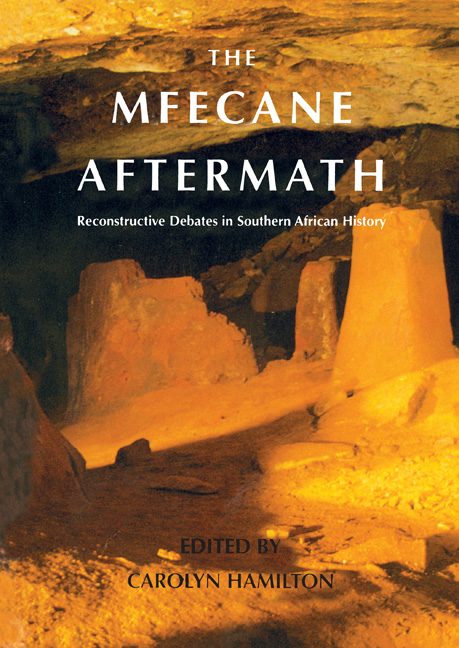Book contents
- Frontmatter
- Contents
- Maps
- Preface
- Acknowledgements
- Notes on Orthography and Names
- Contributors
- Introduction
- Part One Historiography and Methodology
- Part Two The South-Eastern Coastal Region
- Beyond the Concept of the ‘Zulu Explosion’ Comments on the Current Debate
- 5 Sources of Conflict in Southern Africa c. 1800-1830: The ‘Mfecane’ Reconsidered
- 6 Political Transformations in the Thukela-Mzimkhulu Region in the Late Eighteenth and Early Nineteenth Centuries
- 7 The Character and Objects of Chaka’: A Reconsideration of the Making of Shaka as Mfecane Motor
- 8 Matiwane's Road to Mbholompo: A Reprieve for the Mfecane?
- 9 Unmasking the Fingo: The War of 1835 Revisited
- 10 The Mfecane Survives its Critics
- Part Three The Interior
- Glossary
- Abbreviations
- Bibliographer's Note
- Bibliography
- Complete List of Papers Presented at the Colloquium
- Index
Beyond the Concept of the ‘Zulu Explosion’ Comments on the Current Debate
from Part Two - The South-Eastern Coastal Region
Published online by Cambridge University Press: 31 May 2019
- Frontmatter
- Contents
- Maps
- Preface
- Acknowledgements
- Notes on Orthography and Names
- Contributors
- Introduction
- Part One Historiography and Methodology
- Part Two The South-Eastern Coastal Region
- Beyond the Concept of the ‘Zulu Explosion’ Comments on the Current Debate
- 5 Sources of Conflict in Southern Africa c. 1800-1830: The ‘Mfecane’ Reconsidered
- 6 Political Transformations in the Thukela-Mzimkhulu Region in the Late Eighteenth and Early Nineteenth Centuries
- 7 The Character and Objects of Chaka’: A Reconsideration of the Making of Shaka as Mfecane Motor
- 8 Matiwane's Road to Mbholompo: A Reprieve for the Mfecane?
- 9 Unmasking the Fingo: The War of 1835 Revisited
- 10 The Mfecane Survives its Critics
- Part Three The Interior
- Glossary
- Abbreviations
- Bibliographer's Note
- Bibliography
- Complete List of Papers Presented at the Colloquium
- Index
Summary
Since the mid-nineteenth century, writers on the history of southern Africa in the early part of that century have seen the period as one in which an outburst of violent conflict swept through African communities across the central and eastern regions of the subcontinent. Few historians today, if any, would deny that the decades of the 1810s, 1820s and 1830s were a time of widespread upheaval in these regions, but in the last few years a number of commentators have begun to challenge the longaccepted explanation of its primary causes. They have stimulated a debate which has major implications for the way in which historians have so far portrayed the history of southern Africa before the mining revolution of the late nineteenth century. This essay seeks to contextualise a number of contributions to the debate in so far as they are concerned with the region which extends from the area which became Natal to the eastern Cape, and from the Indian Ocean to the basin of the Caledon River.
The north-eastern part of this region, i.e. the area which in the 1820s formed the core of the early Zulu kingdom, has almost universally been seen as the centre of the upheavals referred to. Until very recently these conflicts have generally been regarded in the literature as a consequence of the supposedly explosive expansion of the Zulu kingdom under the ambitious and ruthless leadership of Shaka. A full history of the development of this idea still needs to be written: all that can be said here is that it was the product of a complex interaction between white and black intellectuals, inside and outside southern Africa, that began in the mid-nineteenth century, if not earlier, and has continued to the present day.
The generally accepted view is that the upheavals of the early nineteenth century (which, since the publication of John Omer-Cooper's The Zulu Aftermath in 1966, have been known as the ‘mfecane’) began in the Thukela-Phongolo region in the 1810s with the rise of Shaka and the Zulu kingdom. Zulu depredations into the surrounding territories then set in train a number of separate sets of migrations, which in turn touched off further cycles of violence.
- Type
- Chapter
- Information
- Mfecane AftermathReconstructive Debates in Southern African History, pp. 107 - 122Publisher: Wits University PressPrint publication year: 1995

